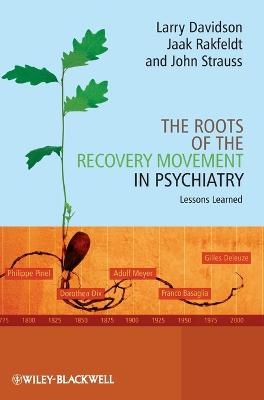
The Roots of the Recovery Movement in Psychiatry
John Wiley & Sons Inc (Verlag)
978-0-470-77763-3 (ISBN)
As the global psychiatric community enters a new era of transformation, this book explores lessons learned from previous efforts with the goal of “getting it right” this time. In response to the common refrain that we know about and ‘do’ recovery already, the authors set the recovery movement within the conceptual framework of major thinkers and achievers in the history of psychiatry, such as Philippe Pinel, Dorothea Dix, Adolf Meyer, Harry Stack Sullivan, and Franco Basaglia. The book reaches beyond the usual boundaries of psychiatry to incorporate lessons from related fields, such as psychology, sociology, social welfare, philosophy, political economic theory, and civil rights. From Jane Addams and the Settlement House movement to Martin Luther King, Jr., and Gilles Deleuze, this book identifies the less well-known and less visible dimensions of the recovery concept and movement that underlie concrete clinical practice.
In addition, the authors highlight the limitations of previous efforts to reform and transform mental health practice, such as the de-institutionalization movement begun in the 1950s, in the hope that the field will not have to repeat these same mistakes. Their thoughtful analysis and valuable advice will benefit people in recovery, their loved ones, the practitioners who serve them, and society at large.
Foreword by Fred Frese, Founder of the Community and State Hospital Section of the American Psychological Association and past president of the National Mental Health Consumers' Association
Larry Davidson is Associate Professor of psychiatry at the Connecticut Mental Health Center at Yale. His patient-oriented research includes recovery from serious mental illness, the development of qualitative and participatory research methods, community-based treatment of psychosis, the development and evaluation of innovative psycho-social interventions, and the promotion of collaborative relationships between people with serious mental illness and their healthcare providers. He received the President's Award, United States Psychosocial Rehabilitation Association, New York Chapter, in 2007 and the Franco Basaglia Memorial Scholarship, Fondazione Basaglia, Rome, Italy, in 2008. Jaak Rakfeldt is Professor of Social Work at the Southern Connecticut State University in New Haven, CT, USA. John Strauss is Emeritus Professor of Psychiatry the Department of Psychiatry at Yale University in New Haven, CT, USA.
Foreword Acknowledgements
1 Introduction
1.1 What is the recovery movement in psychiatry?
1.2 Rationale for the book
1.3 From traitement moral to moral treatment
1.4 Reciprocity in community-based care
1.5 The everyday and interpersonal context of recovery
1.6 Closing the hospital
1.7 The rights and responsibilities of citizenship
1.8 Agency as a basis for transformation
1.9 Why these figures and not others?
1.10 Conclusion
2 FromTraitement Moral to Moral Treatment
2.1 The birth of psychiatry as a medical speciality
2.2 Philippe Pinel and Jean-Baptise Pussin
2.3 Traitement moral
2.4 Pinel’s psychological interventions
2.5 The Retreat at York
2.6 Moral treatment or moral management?
2.7 From treatment to education
2.8 Re-shaping character
2.9 The demise of moral treatment
2.10 Summary of lessons learned
3 Reciprocity in Community-based Care
3.1 The advocacy of dorothea dix
3.2 The legacy of dorothea dix
3.3 Jane Addams’ community alternative
3.4 A series of unfortunate, but influential, events
3.5 The founding of the first american ‘settlement’
3.6 Forty years at hull-house
3.7 Distilling the active ingredients
3.8 Interventions with individuals
3.9 Interventions with collectives
3.10 Applications to mental health
3.11 Summary of lessons learned
4 The Everyday and Interpersonal Context of Recovery
4.1 The birth of psychiatry as a community-based practice
4.2 Beyond the illness paradigm (by John Strauss, part 1)
4.3 Growing up inside meyer’s ‘common sense’ psychiatry (by John Strauss, part 2)
4.4 Subjectivity and the person (by John Strauss, part 3)
4.5 Blending science and art in a human science (by John Strauss, part 4)
4.6 From a psychiatry based in death to a psychiatry based in life
4.7 Problems in everyday living and their resolution
4.8 Opportunity and occupation
4.9 The interpersonal context of recovery
4.10 Summary of lessons learned
5 Closing the Hospital
5.1 The failure of the asylum
5.2 Erving Goffman and the presentation of self
5.3 The hospital as ‘total institution’
5.4 Franco Basaglia and the Italian mental health reform movement
5.5 De-institutionalization the Italian way
5.6 Bracketing the illness
5.7 ‘Freedom is therapeutic’
5.8 Avoiding the re-creation of the asylum in the community
5.9 Social inclusion
5.10 Summary of lessons learned
6 The Rights and Responsibilities of Citizenship
6.1 Recovery as a civil rights movement
6.2 The incomplete world of Martin Luther King, Jnr
6.3 Can rights be given?
6.4 Recovery delayed is recovery denied
6.5 Colour blindness and capitalism
6.6 The complete subject of Gilles Deleuze
6.7 Oedipus and anti-oedipus
6.8 Schizophrenic speech and Watergate
6.9 Community inclusion vs community integration
6.10 Summary of lessons learned
7 Agency as the Basis for Transformation
7.1 The need for a new conceptual framework
7.2 Beyond de-institutionalization and community tenure
7.3 Rights and recovery
7.4 The capabilities approach of Amartya Sen
7.5 Applying a capabilities approach to the work of transformation
7.6 Human agency and mediation: the work of Lev Vygotsky
7.7 Action theory, the zone of proximal development and scaffolding
7.8 Applying activity analysis: the case of fossilized behaviour
7.9 Applying activity analysis: using the zone of proximal development
7.10 Summary of lessons learned
8 Conclusion
References
Index
| Erscheint lt. Verlag | 22.3.2010 |
|---|---|
| Verlagsort | New York |
| Sprache | englisch |
| Maße | 175 x 252 mm |
| Gewicht | 662 g |
| Themenwelt | Geisteswissenschaften ► Psychologie |
| Medizin / Pharmazie ► Medizinische Fachgebiete ► Psychiatrie / Psychotherapie | |
| ISBN-10 | 0-470-77763-X / 047077763X |
| ISBN-13 | 978-0-470-77763-3 / 9780470777633 |
| Zustand | Neuware |
| Haben Sie eine Frage zum Produkt? |
aus dem Bereich


